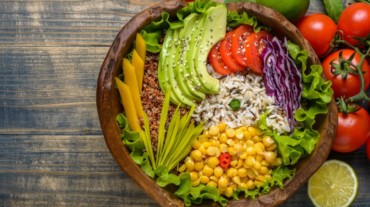Every year during Navratri, devotees fast throughout this Hindu festival in order to pray to Goddess Durga. During this festival, some people keep a fast for just the first one to two days and the last one to two while others keep it for all nine days of the festival. Fasting is not only regarded as auspicious during Navratri; it is also a fantastic way to detoxify your body because it aids in flushing out harmful toxins. However, because of the dietary changes, fasting might also make you lethargic or tired. Let us share some Navratri fasting tips for you!
Tips for Navratri fasting
It is crucial to maintain a healthy energy level during fasting if you want to enjoy the festival. Therefore, if you are fasting during Navratri, you need to remember a few key points.
Health Shots spoke to Anupama Menon, a certified nutritionist and food coach from Bengaluru, who curated a fasting meal plan that’ll help you stay fit and fine during Navratri fasting.
Here are 9 tips to prepare your meal for Navratri fasting:
1. Fasting window
Maintain a 14 to 16 hours fasting window everyday and eat in the remaining hours. A popular intermittent fasting example is the 16/8 method. It features a daily 16-hour fast and an 8-hour eating window wherein you can fit in 2, 3, or more meals. You could also do a 14 hours fasting window for 6 days and 16 hours fasting window for 3 days.
2. Eating window
It is simple, safe, and sustainable to do 16/8. Once you enter in your eating window, keep a gap of no more than 2.5 hours between 2 meals, whether the meals are big/small.

3. Eat healthy
When you eat first in the morning after a 14 or 16-hour window, make sure you eat a good meal, for example, sabudana khichdi or kuttu atta paratha made with potato with a glass of milk/buttermilk. You can also eat fruits that will help detoxify your body. Try not to have any sugar at this meal.
4. Staying hydrated is essential
Keeping yourself hydrated while fasting is very essential as it could reduce hunger pangs significantly. Not only this, drinking water can help beat fatigue and even fainting due to fast. Always keep a water bottle with yourself and keep sipping timely.
5. Cold milk for acidity
Nine days of fasting will definitely help to detoxify your body but diet changes while fasting can lead to acidity or constipation in some people. To deal with it, drink cold milk and keep acidity at bay. You can drink it at around 4 pm or then at night may help. You can also add lemonade or curd in your diet to deal with this problem.
6. Fruits for fibre
Due to fasting, we tend to eat more snacks. But try to stick to healthy snacks only such as fruits. 2-3 servings of fruit not only keep you hydrated but also gives fibre which helps bowel movement. Include fruits like banana, papaya, apple and citrus fruits like orange. Lemon juice throughout the day is a good idea, especially for the absorption of iron from foods.

7. Add sugar but in limits
Once in 2-3 days a bowl or a serving of something sweet will satisfy your taste buds and may also help improve poor energy due to dipping sugar levels. It plays on your mind that you are fasting – it also helps to take away that possible feeling of deprivation. So, a bowl of makhana kheer or sabudana kheer could be great! Remember to consume it in moderation.
8. Nuts for fats
Finally your good fats – make sure you are having a handful of unsalted nuts during the day including almonds, walnuts, pistachio To open your fast in the morning before breakfast, adding one or two teaspoons of ghee/cold pressed coconut oil is the best idea. You could also add unsweetened dry fruits like dates/figs/raisins to your day. Since this diet is zero on veggies, overnight soaked dry fruits could help with the gut.

9. Coconut water
To add taste to your food items, when eating table salt is restricted in the fasting diet, sendha namak, also known as rock salt, can help. Apart from this, consuming coconut water/banana sometime during the day is a good idea.
